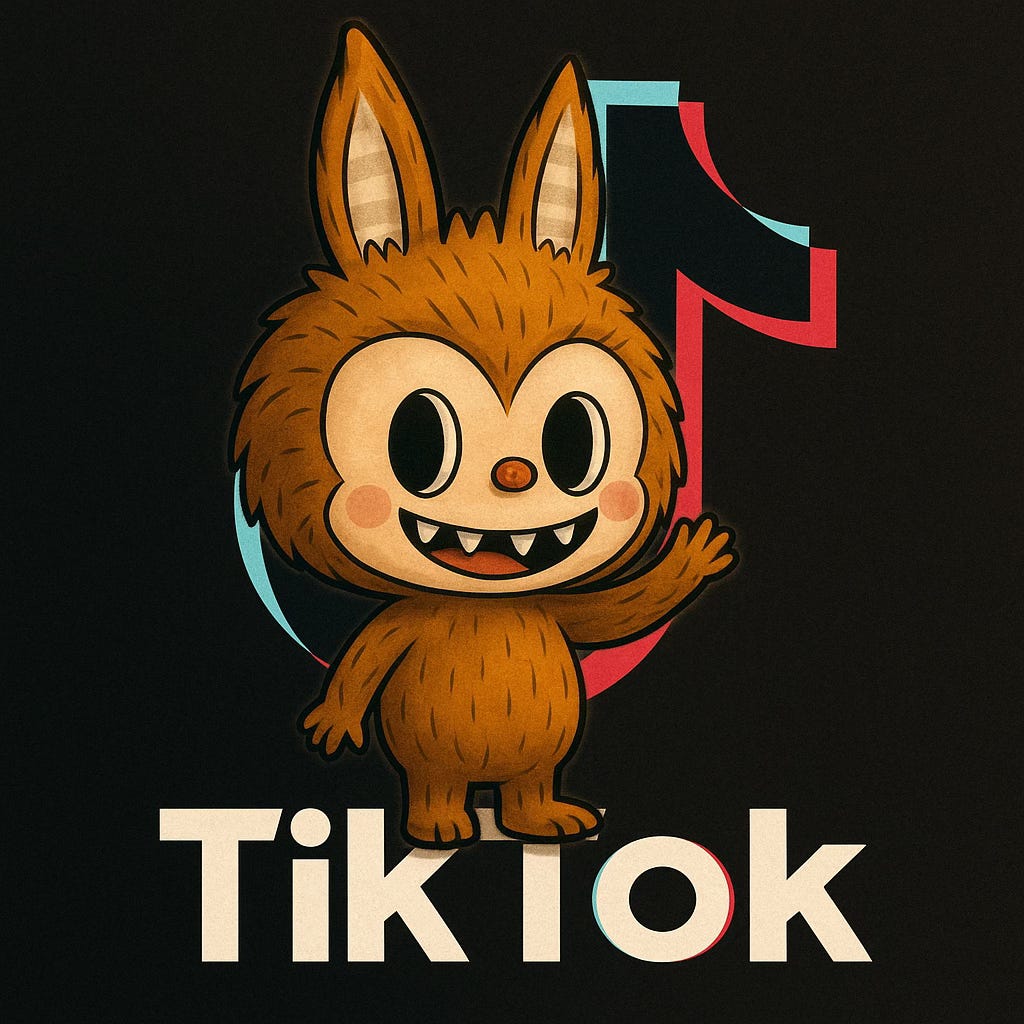TikTok, Pop Mart and the Conditional Logic of Success
Emotional capitalism is the business model for both TikTok and Pop Mart
“To all of those young people of TikTok, I saved TikTok, so you owe me big,” Trump said on his return to the app this week.
The White House would like the TikTok chapter to read as closure. It isn’t. The executive order did something narrower: it set up a U.S. vehicle fronted by Oracle, Silver Lake, and Abu Dhabi’s MGX at roughly half ownership, pushed ByteDance below twenty percent, and kept the app running by licensing a copy of the recommendation engine to be retrained and audited in the United States. Enforcement is paused for 120 days to December 16, even as the Supreme Court has upheld the 2024 sale-or-ban law. This is not a clean break; it is a political workaround. The vector of influence is just rearranged, not removed.
That conditionality is the headline. On the very day the EO landed, I went on the BBC to make the point that TikTok’s five-year saga shows that in the U.S. market, success can be achieved and then renegotiated.
The licensing workaround ultimately hinges on China’s export-control decisions and Ministry of Commerce review. After years of asserting its Americanness, defying, then compromising by paying billions for Project Texas to Oracle, TikTok has been repackaged under a new cap table.
A spin-off backed by politically connected U.S. investors, plus MGX, invites the obvious question: Is it simply swapping one vector of influence for another? The administration opted for a structure that is politically acceptable in the U.S. for now: American local control and an American-dominated board, paired with a deal that China can approve—so both sides can spin it as a win in their respective echo chambers.
But the national-security framing belies a deeper us-versus-them logic and is further escalated by politics.
The cap table is packaging; the mechanic is the same—attention converted into micro-transactions and sold as culture. They are different formats of the attention economy we live in. That’s why I see TikTok and Pop Mart as the same model in different wrappers.
TikTok and Pop Mart’s scale explains the stakes. About one in five American adults now say they regularly get news on TikTok, and among adults under thirty the share rises toward half. A third of U.S. adults use TikTok; and it takes just 260 videos, which could be as quick as 35 minutes, to form a habit on the app.
Pop Mart’s latest half-year results was superb: revenue expanding at triple-digit rates, profits surging, and Labubu “Monsters” line contributing a material share of sales and a meaningful lift to the bottom line. In the first half of 2025, the sales contributed by Pop Mart members represented 91.2% of total sales, with repeat purchase rate over half. The stock has come off its highs, but the Labubu craze continues. The tapering is a signal that the product has moved from hype to mass availability. The curve flattens, units broaden to the mainstream—not just reserved for the it girls and fashion icons—and the community widens.
In a recent conversation with Asia Society’s Lizzi Li, we tried to trace the source of Labubu’s soft power: it is emotional consumption that becomes part of identity. Pop Mart’s appeal is precisely that it feels therapeutic and low-stakes. Open a blind box as a reward after a grinding day and gather enough morale to step back into the involution battlefield tomorrow. Scroll on TikTok and let the dopamine rush quiet the emptiness. It is the lowest-hanging fruit of escapism.
Sociologist Eva Illouz uses “emotional capitalism” to describe a culture in which economic and emotional logics mutually shape each other: economic relations grow deeply emotional, while intimate life is reorganized in market-like terms of bargaining, exchange, and choice. The therapeutic discourse, which promises authenticity and healing, puts psychology at the core of identity and turns the self into a project of continuous management and improvement.
The result is plain: feelings are commodified and commodities are romanticized. Authenticity functions less as a state than as a performance validated by an audience. Identities flatten into marketable traits, reinforced by metrics like follows and likes. This is the operating system that makes Pop Mart feel therapeutic and TikTok feel intimate while both optimize for engagement.
It is fitting, and a little ironic, that Cal Newport, a computer science professor and productivity guru who thrives in that same marketplace of therapeutic betterment, has a superb explanation on the technicalities of TikTok’s system and why a change of hands will not fix TikTok. His thesis points to the fundamental issue of TikTok: it is a large-scale recommender that embeds users and videos and learns purely from behavior. Change owners, license the code, add auditors; the objective remains engagement, so the output remains whatever keeps people watching. The systems do not share our values and do not know what values are. They learn the full range of human patterns, including our darker impulses, and exploit bright and dark alike if it moves the metric. The problem is baked into the math, not the org chart.
Both companies are conduits to younger consumers whose priorities already run faster, more visual, ritualized, and socially legible. You can restrict a feature or tighten a disclosure, but you cannot regulate away the appetite for short hits of recognition and sense of belonging.
Emotional capitalism has taken hold because it feeds on a wider shortage of identity, connection, and meaning, and turns that shortage into commercial opportunity. You can rotate the board, license the model, and buy all the Labubus; however, unless the objective shifts away from raw engagement and the loops that monetize it are slowed and made accountable, the output will not change. Changing hands does not change the engine. It only changes who collects the toll.






https://open.substack.com/pub/thiagodearagao/p/top-5-ways-chinese-stock-exchanges?r=2di31u&utm_medium=ios